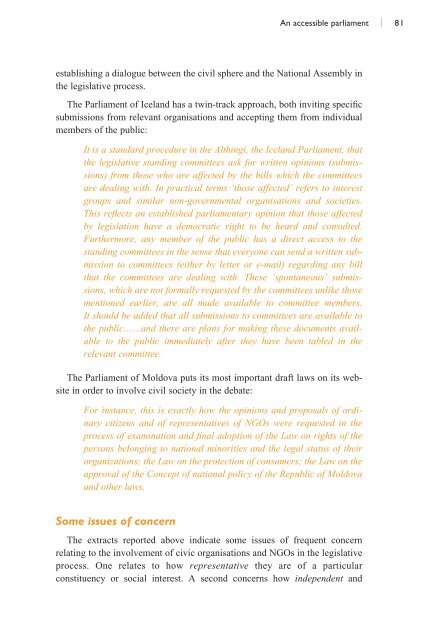PARLIAMENT AND DEMOCRACY - Inter-Parliamentary Union
PARLIAMENT AND DEMOCRACY - Inter-Parliamentary Union
PARLIAMENT AND DEMOCRACY - Inter-Parliamentary Union
You also want an ePaper? Increase the reach of your titles
YUMPU automatically turns print PDFs into web optimized ePapers that Google loves.
An accessible parliament I 81<br />
establishing a dialogue between the civil sphere and the National Assembly in<br />
the legislative process.<br />
The Parliament of Iceland has a twin-track approach, both inviting specific<br />
submissions from relevant organisations and accepting them from individual<br />
members of the public:<br />
It is a standard procedure in the Althingi, the Iceland Parliament, that<br />
the legislative standing committees ask for written opinions (submissions)<br />
from those who are affected by the bills which the committees<br />
are dealing with. In practical terms ‘those affected’ refers to interest<br />
groups and similar non-governmental organisations and societies.<br />
This reflects an established parliamentary opinion that those affected<br />
by legislation have a democratic right to be heard and consulted.<br />
Furthermore, any member of the public has a direct access to the<br />
standing committees in the sense that everyone can send a written submission<br />
to committees (either by letter or e-mail) regarding any bill<br />
that the committees are dealing with. These ‘spontaneous’ submissions,<br />
which are not formally requested by the committees unlike those<br />
mentioned earlier, are all made available to committee members.<br />
It should be added that all submissions to committees are available to<br />
the public……and there are plans for making these documents available<br />
to the public immediately after they have been tabled in the<br />
relevant committee.<br />
The Parliament of Moldova puts its most important draft laws on its website<br />
in order to involve civil society in the debate:<br />
For instance, this is exactly how the opinions and proposals of ordinary<br />
citizens and of representatives of NGOs were requested in the<br />
process of examination and final adoption of the Law on rights of the<br />
persons belonging to national minorities and the legal status of their<br />
organizations; the Law on the protection of consumers; the Law on the<br />
approval of the Concept of national policy of the Republic of Moldova<br />
and other laws.<br />
Some issues of concern<br />
The extracts reported above indicate some issues of frequent concern<br />
relating to the involvement of civic organisations and NGOs in the legislative<br />
process. One relates to how representative they are of a particular<br />
constituency or social interest. A second concerns how independent and

















